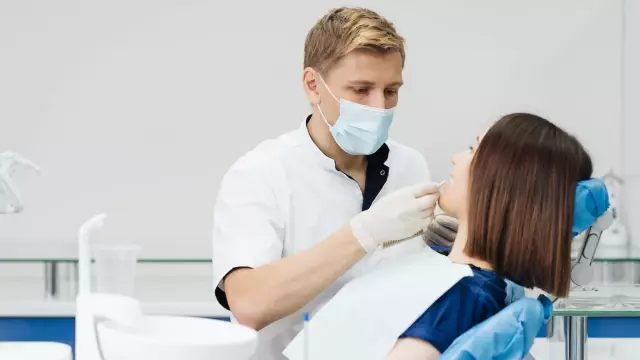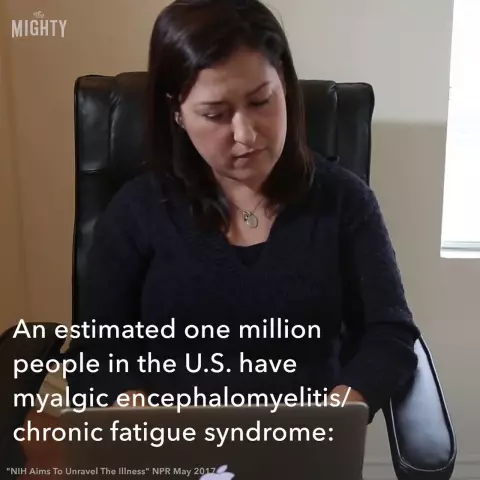- Author Rachel Wainwright wainwright@abchealthonline.com.
- Public 2023-12-15 07:39.
- Last modified 2025-11-02 20:14.
Periodontitis
Brief description of the disease

First, a few words about what a periodontium is. Simply put, these are the tissues that "hold" the tooth, in particular: the gums, bone, ligaments and mucous membrane. Periodontitis is diagnosed in cases where the infection somehow enters the oral cavity and begins to destroy the ligament of the tooth root with the bone, which entails gradual tissue necrosis, and subsequently tooth loss. WHO experts claim that 80% of the adult population of the world has some symptoms of periodontitis. The widespread prevalence of periodontitis is due to a number of factors, the main of which is the lack of care for the beauty and health of your teeth and going to the dentist only when the inflammatory process leads to irreversible consequences!
Causes of periodontitis
Hundreds of thousands of bacteria live and die in the mouth of every person around the clock. Their waste products accumulate on the teeth in the form of plaque. When brushing your teeth, this plaque is removed, but it forms again after a few hours. Within 2-3 days, it hardens and transforms into tartar. You can get rid of it only with the help of professional cleaning in a dental clinic, since both the brush and the dental floss in this case will be powerless. In most cases, it is in the absence of basic oral hygiene that a person begins to develop periodontitis, the symptoms of which make themselves felt at almost any age.
At first, plaque on the teeth causes slight irritation of the gums and gingivitis, but then the ongoing inflammation leads to the formation of "pockets" - the empty space between the teeth and gums, which is filled with bacteria and food debris. As a result, neglected, chronic periodontin leads to the destruction of bone tissue and tooth loss.
In addition to dental calculus, periodontitis is caused by some other reasons:
- smoking, chewing tobacco - nicotine lowers the immune system, creates a favorable environment for the reproduction of bacteria, worsens the healing process of destroyed periodontal tissues;
- poor heredity - when periodontitis is associated with a hereditary predisposition of a person to this disease - brushing your teeth and maintaining oral hygiene will be practically ineffective;
- Medicines - Antidepressants, cold medicines and some other groups of medicines are known to contain substances that reduce saliva production. However, it performs an important disinfecting function, and, accordingly, with a decrease in the amount of secretion, the intensity of plaque formation increases;
- diabetes mellitus and some other diseases can also cause periodontitis (treatment with such a development of events implies the obligatory disposal of the root cause of the disease, since without strengthening the immune system, further measures do not make sense);
- poor nutrition - if the standard diet of a person does not include foods rich in calcium, as well as vitamins B and C, then the risk of developing periodontitis increases several times.
Periodontitis - symptoms of the disease
All periodontal inflammation can be divided into acute and chronic. Acute (generalized) periodontitis has the following symptoms:
- pulsation in the gums;
- constant itching;
- tooth mobility;
- bad breath;
- discomfort when chewing food;
- increased sensitivity of the neck of the teeth.
Over time, the gums become even more painful, swelling, and bleed profusely when brushing your teeth. In addition, generalized periodontitis makes itself felt during meals, when food leftovers get stuck in the "pockets", begin to rot and cause multiple irritations of the periodontal tissues. In some patients, the acute form contributes to an increase in body temperature and the appearance of general weakness.
Chronic periodontitis develops in an acute form that is not treated. It has the same symptoms, but the disease is much more intense. Painful sensations are so strong that a person is forced to refuse to brush his teeth. Thus, he aggravates the course of the disease. Also, chronic periodontitis is characterized by discoloration of the gums, the appearance of gaps between the teeth, difficulty in chewing, and the loss of individual teeth. The depth of the "pockets" often exceeds 5-7 mm. During periods of exacerbation of the inflammatory process, a person feels weakness, sharp throbbing pain, and malaise. Symptoms of heart failure and the release of pus in the affected tissue may occur.
Periodontitis - treatment of the disease
The complex of therapeutic measures should be planned by a dentist. This means that when diagnosed with periodontitis, treatment with folk remedies is an additional method of combating the disease, but in no way a substitute for surgical and therapeutic methods.
If periodontitis was detected at an early stage of development, the course of treatment consists of professional teeth cleaning, removal of calculus and polishing of the tooth surface. The crown and root are treated with special brushes, which are treated with fluorine-containing protective compounds. Cured dental plaque is removed by mechanical treatment or ultrasound. In especially advanced cases, doctors use curettage - a procedure for removing deposits using special hooks.

If the depth of the dental "pockets" exceeds 5 mm, surgical intervention is recommended for patients. The main goal of the operation is to eliminate cavities, stop tissue resorption and do everything possible to ensure that the tooth regains stability. Elimination of pathological mobility is performed using temporary splints or permanent prostheses.
Since both generalized periodontitis and chronic periodontitis are infectious and inflammatory diseases, specialists usually prescribe effective antibiotics for patients. Tetracycline or lincomycin is preferred. In addition, patients should take care of strengthening the immune system and increasing the body's defenses. For this, both common vitamin and mineral complexes are used, as well as special agents - immunocorrectors. Of course, the treatment of periodontitis is not complete without timely filling of diseased teeth, occlusion correction and correction of other local risk factors.
Periodontitis - treatment with folk remedies
Traditional medicine recipes can only help in the early stages of the disease. With the development of the inflammatory process, you should immediately consult a doctor and do not abuse self-medication. Now, here are the most common recipes:
- 6 grams of dry lingonberry leaves are poured with a glass of boiled water and boiled for 20 minutes over low heat. Then the broth is cooled and filtered. Rinse your mouth with medicine every 2-3 hours;
- 2 teaspoons of calendula flowers are brewed in 2 glasses of boiled water. The product is used to rinse the mouth every 3-4 hours;
- with severe bleeding of the gums, it will be useful to rinse your mouth with a tincture of blackberry leaves;
- a decoction of St. John's wort helps against periodontitis. 2 tablespoons of the herb are poured with 2 cups of boiling water and cooked over low heat for 5 minutes. The broth must be infused for 4 hours, then strain and use for rinsing the mouth 3 times a day.
YouTube video related to the article:
The information is generalized and provided for informational purposes only. At the first sign of illness, see your doctor. Self-medication is hazardous to health!






